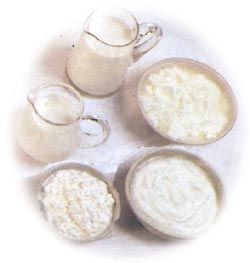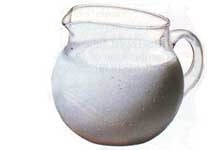|
|
Dairy Intake Linked to Diabetes Prevention
For those concerned about weight and health, the first things often cut from
the diet are high-fat dairy products. But new research suggests high dairy
intake may be healthier than once thought, and actually protect overweight
adults from developing diabetes and heart disease.
 After
tracking more than 3,000 adults for 10 years, researchers report in the Journal
of the American Medical Association that overweight subjects who consumed dairy
products more than 35 times a week suffered 72 percent less insulin resistance
syndrome than those who consumed dairy less than 10 times a week. This
relationship did not hold true for those of normal weight. After
tracking more than 3,000 adults for 10 years, researchers report in the Journal
of the American Medical Association that overweight subjects who consumed dairy
products more than 35 times a week suffered 72 percent less insulin resistance
syndrome than those who consumed dairy less than 10 times a week. This
relationship did not hold true for those of normal weight.
Insulin resistance syndrome, or IRS, is a constellation of four risk factors for
heart disease and diabetes. An individual with two of the four risk factors �
obesity, high blood sugar, high
blood pressure or cholesterol problems � is considered to have the
syndrome.
According to recent estimates by the Centers of Disease Control and Prevention,
approximately one-quarter of adults in the United States have insulin resistance
syndrome. And disturbingly, it has also been characterized in children.
"This is recent, and it certainly must be due to the fact that the prevalence of
obesity in children has doubled in the last decade," says Mark Pereira, lead
author of the study and an epidemiologist at Children's Hospital in Boston.
These trends cause some experts to fear that heart disease rates, which have
been declining since the 1950s and have started to level off in recent years,
will increase and may even occur in younger individuals. While these trends are
worthy of concern, it appears that dairy consumption, by not contributing to the
syndrome, does not contribute to a major risk component of heart disease.
Dairy and Health...
 According
to Pereira, these results counter previous findings that consuming dairy
products might promote obesity. "We found that intake of all types of dairy
products appeared to be protective," he says. Experts say that the protective
benefits of dairy could be explained by the fact that it is rich in healthy
nutrients like protein and calcium. Yet they acknowledge that different
mechanisms may also be at work. Pereira cites U.S. Department of Agriculture
data stating that while children have decreased According
to Pereira, these results counter previous findings that consuming dairy
products might promote obesity. "We found that intake of all types of dairy
products appeared to be protective," he says. Experts say that the protective
benefits of dairy could be explained by the fact that it is rich in healthy
nutrients like protein and calcium. Yet they acknowledge that different
mechanisms may also be at work. Pereira cites U.S. Department of Agriculture
data stating that while children have decreased
their milk consumption over the
past 30 years, their intake of soda has steadily increased.
"It could be that dairy is inherently good for you, but it also could be that
if you are replacing dairy with [unhealthy] things, you are going to drive your
risk up," he explains.
Regardless, experts say dairy remains an important component of a healthy diet.
"Whether the health benefit is from what is included vs. what is excluded always
remains a tricky question, but the evidence continues to mount that including
dairy foods is important to health for more than the calcium it provides," says
Connie Diekman, a registered dietitian and director of university nutrition at
Washington University in St. Louis. "Once again, we are seeing a health and of
course nutritional benefit to including dairy foods in eating plans."
However, consuming too much of the saturated fat that is found in dairy foods
can increase levels of LDL, or "bad" cholesterol � something the current study
did not address.
"The amount of fat in the dairy was not important," says Pereira. "The current
dietary recommendations are to include reduced-fat dairy products in the diet.
We're certainly not even beginning to discuss any possible changes to the
dietary recommendations based on this single study."
"I would say that overweight children and their parents should be concerned
about their weight, but that dairy consumption is not the problem, and may in
fact confer some benefit," says Dr. Christopher D. Saudek, president of the
American Diabetes Association.
|
|
|
|









